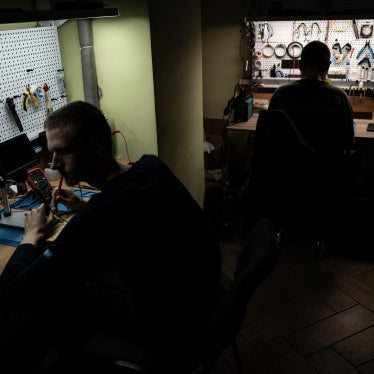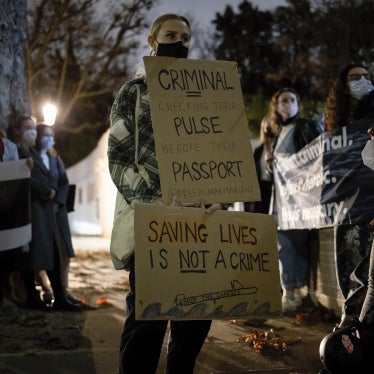(Moscow) – The Kazakh authorities should immediately restore communications with Zhanaozen and ensure an investigation into clashes there between police and civilians is independent, Human Rights Watch said today. Human Rights Watch also called on the Kazakh government to allow independent human rights groups and journalists to work in the area without interference.
On December 17, 2011, the Kazakh government announced a state of emergency in Zhanaozen, a city in western Kazakhstan, in response to clashes and violence that erupted on December 16, around Kazakhstan’s Independence Day celebrations. The emergency measure introduces, among other things, limits on movement within Zhanaozen and into and out of the city, and “limits or bans” on the use of copy machines, certain telecommunication devices, and audio and video recording equipment. Telephone communication with Zhanaozen has also been cut.
“The Kazakh government has a duty to restore order in Zhanaozen, but it can’t invoke a state of emergency to place unjustified and unnecessary restrictions on freedom of information,” said Mihra Rittmann, Central Asia researcher at Human Rights Watch. “By imposing such extensive restrictions, the Kazakh authorities make it hard to know what’s happening in Zhanaozen. They risk undermining their stated commitment to transparency.”
On December 18 two journalists from the Russian daily Kommersant and a Lenta.ru journalist were detained in Zhanaozen and held in custody without explanation for approximately four hours before they were released, according to articles published online. Other journalists who wanted to travel to Zhanaozen that same day were initially not given permission by local authorities in Aktau, according to Radio Azattyk, the Kazakh branch of Radio Free Europe/Radio Liberty, but later the independent newspaper Respublika reported that local authorities provided the journalists transport to the city.
Human Rights Watch has been unable to reach people in Zhanaozen by phone since the afternoon of December 16. The Kazakh Prosecutor General’s office and Ministry of Internal Affairs claimed a damaged cable was likely responsible for connectivity failures and suggested that the damage happened during the violence. However, there is some indication that the government ordered the shut down of at least some mobile, voice, and text services in Zhanaozen.
Under the International Covenant on Civil and Political Rights (ICCPR), to which Kazakhstan is a party, governments may limit certain rights during a state of emergency if they can establish that there is a “public emergency which threatens the life of the nation.” However, any limits on rights and freedoms may only be to the extent strictly required by the situation, and governments must justify limitations as such. Governments must guarantee the right to life, the ban on torture and ill-treatment, the right to liberty and security of person, the right to a fair trial, and freedom of thought, conscience, and religion, among other rights.
Due to the lack of communications, Human Rights Watch was unable to confirm government reports about how the violence started on December 16, who the perpetrators were, and in what circumstances government troops used lethal force.
Multiple sources have reported that clashes started when people who had gathered on Zhanaozen’s main square charged the stage set up for the Independence Day event and broke sound equipment. Striking oil workers had been meeting daily since early July on the square, including on December 16, although it is not known whether they were involved in the violence. On December 17, a representative of the Prosecutor General’s office stated that “police were forced to use service weapons, as a result of which the active participants in the disturbances were wounded.”
Human Rights Watch welcomed President Nursultan Nazarbayev’s December 17 statement that Kazakhstan’s investigation events would be thorough and could include independent experts.
“Independent experts could help to ensure that an official investigation will uncover the truth about events in Zhanaozen,” Rittmann said. “But the government should also ensure that independent groups can conduct their own investigations.”
As of December 18, the Prosecutor General’s office reported that the death toll had reached 13, and that 86 people, including six police officers, were wounded. On December 17, the prosecutor general issued a statement that said the perpetrators were armed with sticks, metal bars, and Molotov cocktails and “used firearms and other weapons.” The Prosecutor General’s office reported that 70 people have been detained and eight arrested in connection with the violence. However it is unclear if the other 62 who were detained have been released and whether the detainees are striking oil workers or others who appeared at the square that day.
“The authorities have a responsibility to ensure that the rights of each detainee are protected – including the right to legal representation of their choice,” said Rittmann. “With the limits on movement and communication in Zhanaozen it is not clear how the authorities are ensuring these rights.”
Violence spread on December 17 to the town of Shetpe, about 160 kilometers from Aktau and home to the families of striking oil workers. A worker close to the situation in Shetpe told Human Rights Watch that workers and town residents had gathered outside the mayor’s office on December 16 and 17 to demand that communications to Zhanaozen be restored, and on Saturday blocked train traffic through the city. Around 9 p.m. the worker reported to Human Rights Watch the train station was burning and that law enforcement agents, including riot police, had dispersed and fired at the crowd.
A statement issued by the Prosecutor General’s office on December 18, said the crowd at Shetpe ignored “the demands of the police and local law enforcement organs to clear the railway tracks” and that once the police “took measures,” most of the crowd dispersed. The statement said that “about 50 hooligans actively resisted the police, set fire to the locomotive of a freight train and threw bottles of flammable liquid at the wagons,” and that the perpetrators attacked the police.
The Prosecutor General office’s statement confirms that police fired shots: “the actions of the hooligans threatened the life and health of peaceful citizens and police, [so] the police were forced to use weapons.” It said 12 people were treated for gun wounds and one of the 12 died.
Since December 16, up to several hundred oil workers have been holding solidarity rallies at Yntymak Square near the mayor’s office in Aktau. One worker told Human Rights Watch they are demanding, among other things, that troops be withdrawn from the region. Another worker said that a group of 30 protesters met with the provincial governor, Krymbek Kusherbaev, on December 17 to relay these demands. Workers also told Human Rights Watch that on December 17 and 18 there was heavy police presence at Yntymak Square.
On December 16, police briefly detained approximately 100 workers who gathered at Yntymak Square in Aktau after the violence erupted in Zhanaozen, according to a worker close to the situation in Aktau. That evening, police also detained Nuriyash Abdraimova, the first secretary of the Mangistau region branch of the now-suspended Communist Party of Kazakhstan, who was also at the square. People close to Abdraimova reported that on December 17, she was sentenced to seven days’ administrative detention. Human Rights Watch was not able to confirm the grounds for her arrest.








